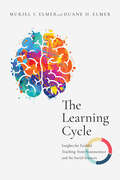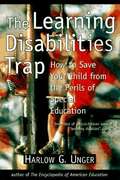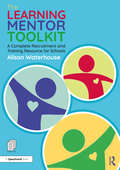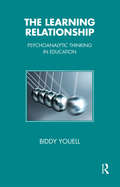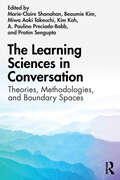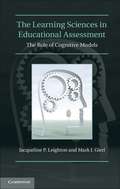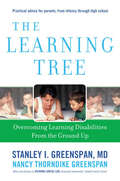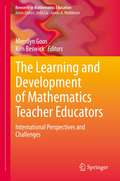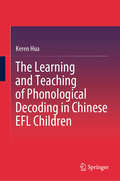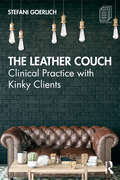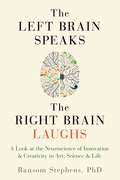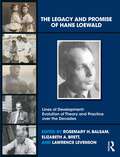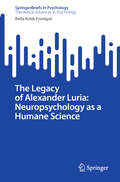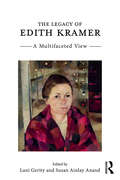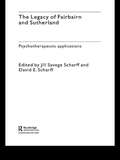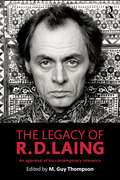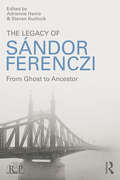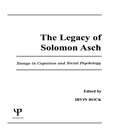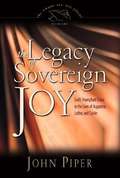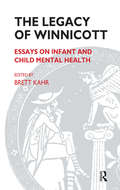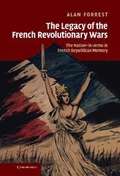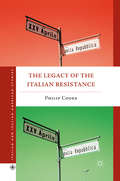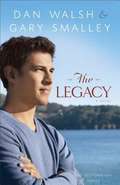- Table View
- List View
The Learning Cycle: Insights for Faithful Teaching from Neuroscience and the Social Sciences
by Duane H. Elmer Muriel I. ElmerHow teachers teach is not necessarily how learners learn.
The Learning Disabilities Trap: How to Save Your Child From the Perils of Special Education
by Harlow G. UngerWhy do educators seek to label more than one-third of our nation's schoolchildren as "learning disabled" when clearly they are not? This practical, easy-to-use book answers that question and shows parents of school-age children how to distinguish between normal learning differences and true learning disabilities; how to have your child properly evaluated at the first sign of a learning difficulty; how to help your child convert learning differences into learning advantages; how to select the right school or program for your child; and how to stimulate your child's intellectual development from infancy onward to enhance progress in school. This book shows parents how to give their children the learning tools and support they need. It also includes core curriculum milestones by which parents can evaluate their children's progress and lists of organizations and schools that can help.
The Learning Disabled Child: Ways That Parents Can Help
by Suzanne H. StevensStevens gives parents what they need to determine whether or not their child has a learning disability. She then provides tips to help parents navigate the public school system in order to obtain help. She also presents adaptive techniques, discusses the therapies which are available and what they can do. She asks parents the tough questions which need to be answered if a learning-disabled child is to succeed in a regular classroom and adapt successfully to the disability. Clear, concises, informative, upbeat, practical.
The Learning Mentor Toolkit: A Complete Recruitment and Training Resource for Schools
by Alison WaterhouseThe Learning Mentor Toolkit provides all of the resources necessary to recruit, train and supervise adult learning mentors looking to support children and young people within the school environment. Packed full of information, this book details all of the necessary training and uncovers how best to ensure that supervision meets the needs of the volunteers, the children and the school. Developed to enable a lead member of staff to find, co-create and train a range of adults from the school community and use these Volunteer Learning Mentors to support children and young people within their environment, the support offered is linked to the five key areas that create positive foundations for mental health and wellbeing: • the ability to create and develop positive relationships • emotional literacy • self-awareness • how our brains can affect learning and behaviour • skills for learning Full of practical advice and resources, this book is the ideal resource for any wellbeing lead or senior leadership team looking to recruit and train learning mentors within their school.
The Learning Relationship: Psychoanalytic Thinking in Education (Tavistock Clinic Series)
by Biddy YouellThis book offers a psychoanalytic perspective on learning and teaching and on many of the issues which preoccupy those who work in educational the origins of learning in children’s early relationships and at factors which help and hinder the educational process in later childhood and adolescence. Amongst the topics addressed in the book are the significance of play and playfulness, the impact of change, separation, times of transition, bereavement, bullying and racism. The author has aimed to set well-established psychoanalytic ideas about lear of current educational practice and to look at the teacher’s experience alongside that of the students.
The Learning Sciences in Conversation: Theories, Methodologies, and Boundary Spaces
by Pratim Sengupta Marie-Claire Shanahan Beaumie Kim Miwa Aoki Takeuchi Kim Koh A. Paulino Preciado-BabbThe Learning Sciences in Conversation explores the unique pluralities, complex networks, and distinct approaches of the learning scientists of today. Focused on four key scholarly areas – transdisciplinarity, design, cognition, and technology – this cutting-edge volume draws on empirical and theoretical foundations to illustrate the directions, perspectives, methods, and questions that continue to define this evolving field. Contributions by researchers are put in dialogue with one another, offering an exemplary analysis of a field that synthesizes, in situ, various scholarly traditions and orientations to create a critical and heterogenous understanding of learning.
The Learning Sciences in Conversation: Theories, Methodologies, and Boundary Spaces
by Pratim Sengupta Marie-Claire Shanahan Beaumie Kim Miwa Aoki Takeuchi Kim Koh A. Paulino Preciado-BabbThe Learning Sciences in Conversation explores the unique pluralities, complex networks, and distinct approaches of the learning scientists of today. Focused on four key scholarly areas – transdisciplinarity, design, cognition, and technology – this cutting-edge volume draws on empirical and theoretical foundations to illustrate the directions, perspectives, methods, and questions that continue to define this evolving field. Contributions by researchers are put in dialogue with one another, offering an exemplary analysis of a field that synthesizes, in situ, various scholarly traditions and orientations to create a critical and heterogenous understanding of learning.
The Learning Sciences in Educational Assessment
by Mark J. Gierl Jacqueline P. LeightonThere is mounting hope in the United States that federal legislation in the form of No Child Left Behind will improve educational outcomes. As titanic as the challenge appears to be, however, the solution could be at our fingertips. This volume identifies visual types of cognitive models in reading, science and mathematics for researchers, test developers, school administrators, policy makers and teachers. In the process of identifying these cognitive models, the book also explores methodological or translation issues to consider as decisions are made about how to generate psychologically informative and psychometrically viable large-scale assessments based on the learning sciences. Initiatives to overhaul educational systems in disrepair may begin with national policies, but the success of these policies will hinge on how well stakeholders begin to rethink what is possible with a keystone of the educational system: large-scale assessment.
The Learning Tree: Overcoming Learning Disabilities from the Ground Up (A Merloyd Lawrence Book)
by Stanley I. Greenspan Nancy Thorndike GreenspanThe internationally admired author of "Engaging Autism" shows parents how to get to the roots of learning disabilities and unleash each childOCOs intellectual potential
The Learning and Development of Mathematics Teacher Educators: International Perspectives and Challenges (Research in Mathematics Education)
by Merrilyn Goos Kim BeswickResearch in mathematics teacher education as a distinctive field of inquiry has grown substantially over the past 10-15 years. Within this field there is emerging interest in how mathematics teacher educators (MTEs) themselves learn and develop. Until recently there were few published studies on this topic, and the processes by which mathematics teacher educators learn, and the forms of knowledge they require for effective practice, had not been systematically investigated. However, researchers in mathematics education are now beginning to investigate the development of MTE expertise and associated issues. This volume draws on the latest research and thinking in this area is therefore timely to stimulate future development and directions. It will survey the emerging field of inquiry in mathematics education, combining the work of established scholars with perspectives of newcomers to the field, with the aim of influencing development of the field, invite cross-cultural comparisons in becoming a mathematics teacher educator by highlighting issues in the development of MTEs in different countries, and examine the roles of both mathematics educators and mathematicians in preparing future teachers of mathematics. The primary audience will be university-based mathematics teacher educators and MTE researchers, and postgraduate research students who are seeking academic careers as MTEs. Additional interest may come from teacher educators in disciplines other than mathematics, and education policy makers responsible for accreditation and quality control of initial teacher education programs.
The Learning and Teaching of Phonological Decoding in Chinese EFL Children
by Keren HuaThis book presents the learning and teaching of phonological decoding in Chinese EFL primary classrooms. The phonological decoding ability of the children is described, interpreted, and evaluated, the teaching materials are analyzed and the classroom instruction observed, and the links between these various facets are explored using both quantitative and qualitative techniques (textbook analysis, classroom observations, interviews with teachers and a textbook writer, reading test and nonword reading test). This book provides insights into Chinese children’s phonological decoding profile, including performance in decoding different types of orthographic units, the strategies children at different levels of reading ability use to sound out vowel graphemes, and their decoding ability in relation to reading ability. The investigation of the teaching practices reveals how the decoding instruction is designed, developed, and delivered to the children and thereby informs the interplay between the classroom instruction and children’s development of phonological decoding skills.
The Leather Couch: Clinical Practice with Kinky Clients
by Stefani GoerlichThe Leather Couch provides a comprehensive overview of the BDSM and kink community and guides clinicians on how to meet the unique relational and mental health needs of its members. The text offers a 101-style introduction to BDSM before delving into topics ranging from intersectionality within the kink community, to conducting a kink-affirming risk assessment and how to discern between domestic violence and consensual power-exchange. The author explores differential diagnoses and clinical concerns that are relevant to health care providers, including social workers and therapists as well as primary care physicians and sex educators. Interwoven throughout with real-world case studies, each chapter presents practical suggestions, tools, and handouts the reader can use to inform their practice and serve clients in ways that meet the needs of each individual, couple, or partnership. Written in a conversational, accessible style for clinicians and members of the BDSM community alike, The Leather Couch is the go-to resource for any mental health professional or educator looking to transform their practice from kink aware to kink affirming.
The Left Brain Speaks, the Right Brain Laughs
by Ransom StephensIn The Left Brain Speaks, but the Right Brain Laughs, physicist Ransom Stephens explains the interesting and often amusing tale of how the human brain works. Using understandable metaphors and easy to follow language, Stephens gives readers of any scientific level an introduction to neuroscience and shows them how things like creativity, skill, and even perception of self can grow and change by utilizing the body's most important muscle. Fans of Bill Nye and Neil deGrasse Tyson will love Stephens' down to earth attitude and those interested in science will appreciate his thoughtful explanations of scientific terms. The Left Brain Speaks, but the Right Brain Laughs is the perfect gift for anyone who wants to know what's going on inside their head and how they can use that knowledge to make themselves the best humans they can be.
The Legacy and Promise of Hans Loewald (ISSN)
by Rosemary H. Balsam Elizabeth A. Brett Lawrence LevensonAlongside its continuing volume, The Emerging Tradition of Hans Loewald, this rich collection of essays addresses the current lack of familiarity with the ideas and life of the eminent psychoanalytic teacher and scholar, Hans Loewald (1906–1993), by presenting the most comprehensive account of his work ever produced.Its chapters present Loewald’s intellectual history and his reception in the North American psychoanalytic scene, as well as clinical developments from his thinking and their importance for the future. An obituary, written by a close friend, also provides a summary of Loewald’s personal and professional life. With the benefit of authors being able to detect the functions and place of Heidegger’s teaching in Loewald’s thought, this book will newly enlighten readers to Heidegger’s place in Loewald’s expansive, open-system vision of the psyche.Featuring contributions from those who worked directly with Loewald, and those inspired by his ideas, this book will be essential reading for any psychoanalyst or psychotherapist working today.
The Legacy of Alexander Luria: Neuropsychology as a Humane Science (SpringerBriefs in Psychology)
by Bella Kotik-FriedgutThis book invites you into the remarkable life and enduring legacy of Alexander Romanovich Luria whose groundbreaking contributions to understanding of the human mind continue to reverberate through modern neuroscience and clinical practice. Drawing from previously unknown personal diaries, intimate family archives, and firsthand accounts from those who knew him best, this book depicts the man behind the science. Born in revolutionary Russia and navigating the tumultuous political landscape of the Soviet era, Luria emerged as a brilliant mind whose work transcended borders and ideologies. It is not merely a biography—it is an invitation to discover how one exceptional scientist's blend of brilliant observation, methodological innovation, and profound empathy created a legacy that continues to transform how we understand and treat neurological conditions today. The book highlights Luria's revolutionary contributions to neuropsychology, his unique "romantic science" approach, and the personal insights offered through previously unpublished materials. What made Luria truly exceptional was his refusal to reduce patients to clinical cases. Instead, he pioneered what he called "romantic science"—an approach that honored the whole person behind the neurological condition. This small book gives the reader in-depth analysis of two of Luria&’s celebrated case studies. The Mind of a Mnemonist and The Man with a Shattered World, including the &“afterlife&” of these books, showing that decades later, Luria's work remains essential reading for anyone seeking to understand the complex relationship between brain, mind, and human experience. Delving into personal accounts from Luria&’s students and collaborators highlights his pivotal role in shaping the global neuropsychology community. His visionary approach to education established him as a mentor who profoundly influenced generations, leaving an enduring legacy through his systemic-dynamic method. His influence continues to resonate today, as his students make his ideas accessible to a new generation of scientists through webinars, conferences, books, and journal publications, including the Lurian Journal.
The Legacy of Edith Kramer: A Multifaceted View
by Lani Gerity Susan Ainlay AnandThe Legacy of Edith Kramer presents a unique exploration into the life and work of the groundbreaking artist and art therapist. This edited volume examines the artist’s personal and cultural history prior to relocating to the United States as well as the later years when she worked as an artist, art therapist, and teacher as she developed her theoretical understanding of art therapy. Kramer’s solutions to creating a meaningful artist’s life run throughout the chapters within this book, and provide the reader with a sense of what is possible. Written by an international group of contributors, this informative new text offers a multifaceted view of Edith Kramer that will be appreciated by current and future art therapists looking to better understand Kramer’s exceptional mind and contributions to the field.
The Legacy of Fairbairn and Sutherland: Psychotherapeutic Applications
by Jill Savege Scharff David E. ScharffThe Legacy of Fairbairn and Sutherland provides the first comprehensive review of W.R.D. Fairbairn and John Sutherland's theories on psycho-social development. It reviews Fairbairn and Sutherland's ideas, traces the philosophical roots of their thinking, explores their legacy, and demonstrates their relevance to contemporary practice. International contributors set these psychoanalytic theories in their philosophical and cultural context. They discuss the growing acceptance of Fairbairn and Sutherland's work in Europe and the Americas. They discuss the theories' impact on current thinking in subjects such as sexuality, hysteria, autonomy and repression. They re-examine the theories in the light of current clinical experience, illuminate them with reference to contemporary psychoanalytic theories and illustrate them with examples from work with children, adults, groups and families.This book presents an original fusion of the ideas of two of the most noteworthy figures in recent psychoanalysis. It will prove fascinating reading for all practicing and training psychotherapists and psychoanalysts.
The Legacy of R. D. Laing: An appraisal of his contemporary relevance
by M. Guy ThompsonThe name R. D. Laing continues to be widely recognized by those in the psychotherapy community in the United States and Europe. Laing’s books are a testament to his breadth of interests, including the understanding of madness, alternatives to conventional psychiatric treatment, existential philosophy and therapy, family systems, cybernetics, mysticism, and poetry. He is most remembered for his devastating critique of psychiatric practices, his controversial rejection of the concept of ‘mental illness,’ and his groundbreaking center for people in acute mental distress at Kingsley Hall, London. Most of the books that have been published about Laing have been written by people who did not know him personally and were unfamiliar with Laing the man and teacher. The Legacy of R. D. Laing: An appraisal of his contemporary relevance is composed by thinkers and practitioners who knew Laing intimately, some of whom worked with Laing. This collection of papers brings a perspective and balance to Laing’s controversial ideas, some of which were never addressed in his books. There has never been a collection of papers that address so thoroughly the question of who Laing was and why he became the most famous psychiatrist in the world. As M. Guy Thompson’s collection illustrates, there are now a number of alternatives to psychiatry throughout the world, and much of this can be credited to Laing’s influence. The Legacy of R. D. Laing will ensure the reader has a keen grasp of who Laing was, what it was like to be his patient or his friend, and why his thinking was far ahead of its time, even in the radical era of the 1970s. It is timely to appraise the nature of his contribution and bring Laing back into contemporary conversations about the nature of sanity and madness, and more humane approaches to helping those in profound mental distress. This book offers an in-depth insight into the work of R.D. Laing. It will be a must read for psychoanalysts, psychotherapists, family therapists, psychiatrists and academics alike. M. Guy Thompson, PhD is a Personal and Supervising Analyst at the Psychoanalytic Institute of Northern California and Chairman of Free Association, Inc., a non-profit organization devoted to the dissemination of Laing’s ideas, in San Francisco. Dr. Thompson received his psychoanalytic training from R. D. Laing and associates at the Philadelphia Association and is the author of numerous books and journal articles on psychoanalysis, phenomenology, and schizophrenia. He currently lives in San Rafael, California.
The Legacy of Sandor Ferenczi: From ghost to ancestor (Relational Perspectives Book Series)
by Adrienne Harris Steven KuchuckWinner of the 2016 Gradiva Award for Edited Book The Legacy of Sándor Ferenczi, first published in 1993 & edited by Lewis Aron & Adrienne Harris, was one of the first books to examine Ferenczi’s invaluable contributions to psychoanalysis and his continuing influence on contemporary clinicians and scholars. Building on that pioneering work, The Legacy of Sándor Ferenczi: From Ghost to Ancestor brings together leading international Ferenczi scholars to report on previously unavailable data about Ferenczi and his professional descendants. Many—including Sigmund Freud himself—considered Sándor Ferenczi to be Freud’s most gifted patient and protégé. For a large part of his career, Ferenczi was almost as well known, influential, and sought after as a psychoanalyst, teacher and lecturer as Freud himself. Later, irreconcilable differences between Freud, his followers and Ferenzi meant that many of his writings were withheld from translation or otherwise stifled, and he was accused of being mentally ill and shunned. In this book, Harris and Kuchuck explore how newly discovered historical and theoretical material has returned Ferenczi to a place of theoretical legitimacy and prominence. His work continues to influence both psychoanalytic theory and practice, and covers many major contemporary psychoanalytic topics such as process, metapsychology, character structure, trauma, sexuality, and social and progressive aspects of psychoanalytic work. Among other historical and scholarly contributions, this book demonstrates the direct link between Ferenczi’s pioneering work and subsequent psychoanalytic innovations. With rich clinical vignettes, newly unearthed historical data, and contemporary theoretical explorations, it will be of great interest and use to clinicians of all theoretical stripes, as well as scholars and historians.
The Legacy of Solomon Asch: Essays in Cognition and Social Psychology
by Irvin RockThis volume honors Solomon Asch, a pioneer in social psychology whose experiments in this field are considered classic. Asch has made important contributions to the fields of memory, learning and thinking, and perception along with extending Gestalt theories to social psychology research. Former students and colleagues honor Asch with essays that either expand on his research or describe original research on new topics of related interest. An interesting and informative text for faculty and researchers in the fields of cognition and perception as well as social, experimental, and personality psychology.
The Legacy of Sovereign Joy: God's Triumphant Grace in the Lives of Augustine, Luther and Calvin
by John PiperAn uplifting look at three famous and flawed fathers of the Christian church and how their lives can inspire us to fall in love with God and, through Him, find the power to overcome our weaknesses.
The Legacy of Winnicott: Essays on Infant and Child Mental Health
by Brett KahrThis book highlights some of Donald Winnicott's contributions that particularly illustrate the originality of his thought. It focuses on some of his indirect as well as direct contributions to psychoanalytic technique.
The Legacy of the French Revolutionary Wars: The Nation-in-Arms in French Republican Memory
by Alan ForrestA major contribution to the study of collective identity and memory in France, this book examines a French republican myth: the belief that the nation can be adequately defended only by its own citizens, in the manner of the French revolutionaries of 1793. Alan Forrest examines the image of the citizen army reflected in political speeches, school textbooks, art and literature across the nineteenth century. He reveals that the image appealed to notions of equality and social justice, and with time it expanded to incorporate Napoleon's victorious legions, the partisans who repelled the German invader in 1814 and the people of Paris who rose in arms to defend the Republic in 1870. More recently it has risked being marginalized by military technology and by the realities of colonial warfare, but its influence can still be seen in the propaganda of the Great War and of the French Resistance under Vichy.
The Legacy of the Italian Resistance
by Philip CookeThis book adds to this growing body of scholarship on the Italian Resistance by analysing, for the first time, how the 'three wars' are represented over the broad spectrum of Resistance culture from 1945 to the present day. Furthermore, it makes this contribution to scholarship by bridging the gap between historical and cultural analysis. Whereas historians frequently use literary texts in their writings, they are often flawed by an insufficiently nuanced understanding of what a literary text is. Likewise, literary critics who have discussed writers such as Calvino and Vittorini, or films such Pais#65533; and La notte di San Lorenzo, only refer in passing to the historical context in which these works were produced. By fusing historical and cultural analysis, author Philip Cooke makes a unique contribution to our understanding of a key period of Italian history and culture.
The Legacy: A Novel (Restoration Series #4)
by Gary Smalley Dan WalshFor years, Doug Anderson has been drifting slowly but steadily away from both his family and his faith. His parents, along with Christina, a young woman taken into the family during a crisis pregnancy, have been trying to reach him before he falls too far. But sometimes you have to hit bottom before you're ready to grow up and give your life over to God. Christina's feelings for Doug have been growing, even though he writes her off as not worth his time. Will Doug's own crisis finally clear his vision and help him focus on what he has right in front of him? Readers who have been on this emotional and romantic journey with the Anderson family will fall in love with this satisfying conclusion to the popular series.
